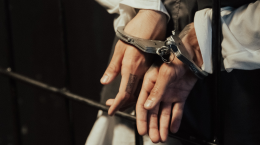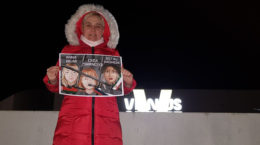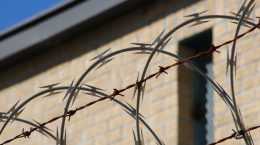There are more and more political prisoners in Belarus – and not only they need help, but also their families, children left without fathers and mothers. After the 2020 elections, many initiatives aimed at supporting those convicted for political reasons appeared in Belarus. “Our House” also did not pass by. Today we will tell you about what we have managed to do to make the life of political prisoners a little easier.
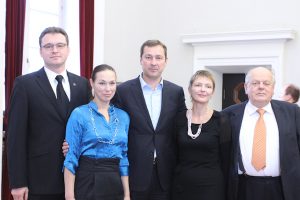 People persecuted for their political views appeared in Belarus long before the 2020 elections. “Our House” has been paying attention to political prisoners in Belarus since the beginning of its activity. In 2011, Olga Karach attended a meeting with the Mayor of Vilnius, Arturas Zuokas. The first head of independent Belarus Stanislav Shushkevich, former political prisoner Alexander Otroshchenkov, wives of political prisoners Dmitry Bondarenko and Mikalai Statkevich Olga Bondarenko and Marina Adamovich were also present at the same meeting. Artur Zuokas could learn firsthand about the situation in Belarus and said that he was ready to do everything in his power to make as many Lithuanians as possible aware of the situation in Belarus. Olga Karach shared her impressions of the meeting: “The Belarusian opposition should feel the support of European structures and Lithuania. We have many common points – from the nuclear power plant in Ostrovets (which worries both Lithuanians and Belarusians) to the joint business projects development. Coordination and information exchange are significant points for the implementation of any strategies about Belarus.”
People persecuted for their political views appeared in Belarus long before the 2020 elections. “Our House” has been paying attention to political prisoners in Belarus since the beginning of its activity. In 2011, Olga Karach attended a meeting with the Mayor of Vilnius, Arturas Zuokas. The first head of independent Belarus Stanislav Shushkevich, former political prisoner Alexander Otroshchenkov, wives of political prisoners Dmitry Bondarenko and Mikalai Statkevich Olga Bondarenko and Marina Adamovich were also present at the same meeting. Artur Zuokas could learn firsthand about the situation in Belarus and said that he was ready to do everything in his power to make as many Lithuanians as possible aware of the situation in Belarus. Olga Karach shared her impressions of the meeting: “The Belarusian opposition should feel the support of European structures and Lithuania. We have many common points – from the nuclear power plant in Ostrovets (which worries both Lithuanians and Belarusians) to the joint business projects development. Coordination and information exchange are significant points for the implementation of any strategies about Belarus.”
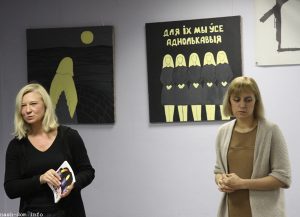 In 2012, “Our House” presented the campaign “Beware, police!” in Lithuania, which is also dedicated to political prisoners. Speaking about the course of the campaign, Olga Karach noted that the security forces have two lives: “One life, where he is probably a caring father and a loving son. And there is another one – in the pre-trial detention centre, where he allows himself everything, up to sexual threats and all sorts of indecent comments. We decided to tell about this life through the girls who got jailed, journalists, human rights defenders, public activists, women politicians – victims of police violence.” The campaign materials revealed the specific “women” problems that the participants faced in prison and the attitude of male policemen to female demonstrators. And former political prisoners made speeches at the presentation.
In 2012, “Our House” presented the campaign “Beware, police!” in Lithuania, which is also dedicated to political prisoners. Speaking about the course of the campaign, Olga Karach noted that the security forces have two lives: “One life, where he is probably a caring father and a loving son. And there is another one – in the pre-trial detention centre, where he allows himself everything, up to sexual threats and all sorts of indecent comments. We decided to tell about this life through the girls who got jailed, journalists, human rights defenders, public activists, women politicians – victims of police violence.” The campaign materials revealed the specific “women” problems that the participants faced in prison and the attitude of male policemen to female demonstrators. And former political prisoners made speeches at the presentation.
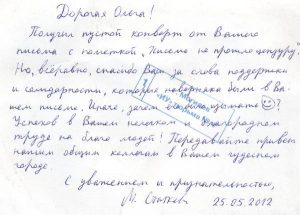 We supported political prisoners both informatively and morally – for example, by letters. In 2012, when former presidential candidate Mikalai Statkevich was serving his sentence, Olga Karach corresponded with a political prisoner. Even then, “Our House” discovered a problem with the transfer of letters to Nikolai Statkevich. He was in the Mogilev prison, where he was transferred from the Shklov colony. Mikalai Statkevich received an empty envelope from Olga Karach with a message that the letter had not passed censorship, which he made known in a postcard.
We supported political prisoners both informatively and morally – for example, by letters. In 2012, when former presidential candidate Mikalai Statkevich was serving his sentence, Olga Karach corresponded with a political prisoner. Even then, “Our House” discovered a problem with the transfer of letters to Nikolai Statkevich. He was in the Mogilev prison, where he was transferred from the Shklov colony. Mikalai Statkevich received an empty envelope from Olga Karach with a message that the letter had not passed censorship, which he made known in a postcard.
In 2014, activists of “Our House” met political prisoner human rights defender Ales Bialiatski from prison. He spent 1,052 days in captivity after being detained on August 4, 2011. The reason was allegedly tax evasion. On September 15, 2011, the European Parliament adopted a resolution on the Ales Bialiatski case and called for release. Ales Bialiatski did not admit his guilt. The European Commission said that the charges on which Ales Bialiatski was tried were politically motivated to interfere with his work to support victims of repression. In the colony, Ales Bialiatski went through numerous penalties – and what was his surprise when he was released from the Bobruisk colony under an amnesty. In Minsk, he was met by journalists, friends and colleagues, and the train, which he arrived, was greeted with stormy applause, national symbols and slogans “Long live Belarus!”.
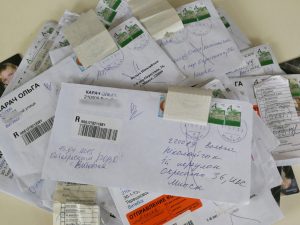 In 2017, we launched the campaign “OKrestina.no”, dedicated to correspondence for political prisoners. Their number in the country increased after the protests in March 2017, when the people of Belarus spoke out against the introduction of a new unemployment tax. “Our House” expressed solidarity with political prisoners with both thematic flash mobs and letters of support. Our activists were among the political prisoners. They said that many letters were mysteriously “lost” and did not reach the addressee, depriving him of significant psychological help. In February-March 2017, a total of about 1,000 people were detained, including 181 women. As part of the solidarity campaign, “Our House” wrote 1,324 letters to political prisoners. After some letters were returned to the sender, and some did not reach the recipients, we started the “OKrestina.no” campaign.
In 2017, we launched the campaign “OKrestina.no”, dedicated to correspondence for political prisoners. Their number in the country increased after the protests in March 2017, when the people of Belarus spoke out against the introduction of a new unemployment tax. “Our House” expressed solidarity with political prisoners with both thematic flash mobs and letters of support. Our activists were among the political prisoners. They said that many letters were mysteriously “lost” and did not reach the addressee, depriving him of significant psychological help. In February-March 2017, a total of about 1,000 people were detained, including 181 women. As part of the solidarity campaign, “Our House” wrote 1,324 letters to political prisoners. After some letters were returned to the sender, and some did not reach the recipients, we started the “OKrestina.no” campaign.
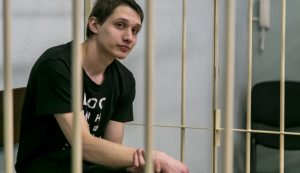 In 2019, we wrote about the torture of political prisoner Dmitry Poliyenko, a long-term fighter against the Lukashenka regime. We have tracked the history of his stay in prison since 2016. We noted that even in freedom, the security forces continued to violate Dmitry’s rights, preventing him from getting a job and integrating into society. The detentions of Dmitry Polienko in 2019 for drawing graffiti and a photo with a blank sheet of paper were not justified – he did not do anything that would be prohibited by the Law of the Republic of Belarus. During his arrests, he faced torture, violence and ill-treatment by the security forces. And during his stay in the colony, Dmitry was deprived of visits, restricted in money for purchases in the prison store, placed in a penal isolation cell for far-fetched “violations”, deprived of correspondence and calls, did not provide medical assistance. To get vital medicines, the political prisoner went on a hunger strike, and then he was transferred to the RNPC of Mental Health altogether.
In 2019, we wrote about the torture of political prisoner Dmitry Poliyenko, a long-term fighter against the Lukashenka regime. We have tracked the history of his stay in prison since 2016. We noted that even in freedom, the security forces continued to violate Dmitry’s rights, preventing him from getting a job and integrating into society. The detentions of Dmitry Polienko in 2019 for drawing graffiti and a photo with a blank sheet of paper were not justified – he did not do anything that would be prohibited by the Law of the Republic of Belarus. During his arrests, he faced torture, violence and ill-treatment by the security forces. And during his stay in the colony, Dmitry was deprived of visits, restricted in money for purchases in the prison store, placed in a penal isolation cell for far-fetched “violations”, deprived of correspondence and calls, did not provide medical assistance. To get vital medicines, the political prisoner went on a hunger strike, and then he was transferred to the RNPC of Mental Health altogether.
“The absolute human rights violation in this situation is the torture that Dmitry was subjected to during his stay in the colony and during numerous detentions. Cruel and inhuman treatment of a person is a direct violation of Article 25 of the Constitution of the Republic of Belarus, as well as the provisions of the UN Convention against Torture and Other Cruel, Inhuman or Degrading Treatment or Punishment, ratified by Belarus. It should be noted that the case of Poliyenko, widely covered in the media space, looks like a demonstrative act on the part of the authorities. We believe that the essence of this “demonstrative flogging” of an anarchist is the intention to reduce the social activity of citizens, demonstrating that “this will happen to everyone” who opposes the system,” our experts concluded after monitoring the situation with a political prisoner.
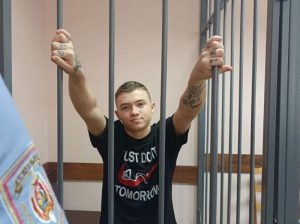 After the 2020 elections, we have increased our support for political prisoners. We were among the first to deal with Mikita Zalatarou case, a minor who happened to be in the city on the night of August 10, 2020, when riots raged on the streets. Mikita was accused of “throwing a bottle with the smell of gasoline” in the direction of the Interior Ministry employees. Since August 11, 2020, he has been held captive by the punishers. Mikita has repeatedly said that he is beaten every day in the pre-trial detention centre, that they tell him that he is “political” and “will die”. Mikita and his family have repeatedly received assistance from the ICCI “Our House”. We are constantly in touch with Mikita’s father. In March 2021, the human rights defenders of our centre compiled and sent letters to the UN Committee against Torture and Amnesty International with a request to help immediately stop violence against a teenager. Mikita’s name is mentioned in our monitoring reports on child abuse – these monitoring reports have been sent to many international organizations.
After the 2020 elections, we have increased our support for political prisoners. We were among the first to deal with Mikita Zalatarou case, a minor who happened to be in the city on the night of August 10, 2020, when riots raged on the streets. Mikita was accused of “throwing a bottle with the smell of gasoline” in the direction of the Interior Ministry employees. Since August 11, 2020, he has been held captive by the punishers. Mikita has repeatedly said that he is beaten every day in the pre-trial detention centre, that they tell him that he is “political” and “will die”. Mikita and his family have repeatedly received assistance from the ICCI “Our House”. We are constantly in touch with Mikita’s father. In March 2021, the human rights defenders of our centre compiled and sent letters to the UN Committee against Torture and Amnesty International with a request to help immediately stop violence against a teenager. Mikita’s name is mentioned in our monitoring reports on child abuse – these monitoring reports have been sent to many international organizations.
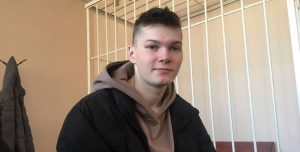 Another minor whom we helped is Vitaly Prokhorov. The guy was accused of participating in group actions violating public order (Article 342 of the Criminal Code) and violence against a policeman (Article 364 of the Criminal Code). According to the prosecution, Vitaly threw at least one stone into the police bus, which caused material damage to the car (820 rubles). He got two years in an educational colony. We talked to Vitaly’s mother and provided support to the young political prisoner. His case was included in our reviews on the torture of children in places of detention.
Another minor whom we helped is Vitaly Prokhorov. The guy was accused of participating in group actions violating public order (Article 342 of the Criminal Code) and violence against a policeman (Article 364 of the Criminal Code). According to the prosecution, Vitaly threw at least one stone into the police bus, which caused material damage to the car (820 rubles). He got two years in an educational colony. We talked to Vitaly’s mother and provided support to the young political prisoner. His case was included in our reviews on the torture of children in places of detention.
Immediately after the elections on August 9, 2020, numerous protests of residents began in Pinsk. It was a resonant event for the district centre. Pinsk has never seen such brutality of the security forces that the people who found themselves in the city centre that August evening faced. According to the criminal case opened immediately, 14 people were accused. “Our House” followed the developments in Pinsk and helped political prisoners with the payment of lawyers and food parcels. Here we have posted an interview with the accused in the “Pinsky case”. We also managed to talk to the sister of another man. She noted the support of “Our House”. We published an interview with the mother of a young political prisoner who received 5.5 years in this case. Finally, we followed the course of the court sessions and noted that the sentences of those who tried to protect their health from riot police criminals are unfair. The story of Elena Movshuk – the only woman on trial, was included in the monitoring dedicated to repressions against Belarusian women.
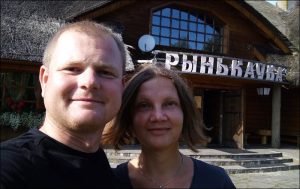 Spouses Andrey Sharendo and Polina Sharendo-Panasyuk from Brest have already managed to delight the whole of Belarus more than once. It is enough to recall Polina’s speech in court when she said that she was captured and would not stand up to the bandits, declared the use of violence against her and accused the judge of participating in political repression. Her husband Andrey did not lag behind Polina either. He was accused of calling for actions aimed at harming the external security of Belarus, insulting Lukashenka, slandering Lukashenka. Most likely, Andrei would also have faced a sentence, but he did not appear at his trial and went abroad thanks to the assistance of the ICCI “Our House” and our friends – the public association “Dapamoga”. We helped the family back in Belarus, and we didn’t leave them abroad either.
Spouses Andrey Sharendo and Polina Sharendo-Panasyuk from Brest have already managed to delight the whole of Belarus more than once. It is enough to recall Polina’s speech in court when she said that she was captured and would not stand up to the bandits, declared the use of violence against her and accused the judge of participating in political repression. Her husband Andrey did not lag behind Polina either. He was accused of calling for actions aimed at harming the external security of Belarus, insulting Lukashenka, slandering Lukashenka. Most likely, Andrei would also have faced a sentence, but he did not appear at his trial and went abroad thanks to the assistance of the ICCI “Our House” and our friends – the public association “Dapamoga”. We helped the family back in Belarus, and we didn’t leave them abroad either.
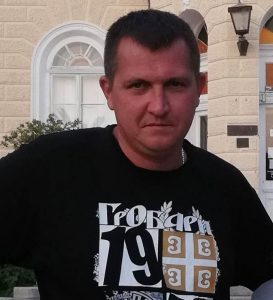 The former security officer Dmitry Kulakovsky worked in the Factory police department of Minsk before the elections, had professional awards and commendations from the leadership. After the elections, he said that he did not agree with the government and resigned. After that, he was accused of insulting a representative of the authorities (Article 369 of the Criminal Code). For this, on January 22, 2021, he received two years of chemistry. While behind bars, he did not receive the necessary medical care – he swallowed a spoon to be given vital medicines. Dmitry’s wife turned to “Our House” for help in paying for a lawyer. We also helped the family with food packages.
The former security officer Dmitry Kulakovsky worked in the Factory police department of Minsk before the elections, had professional awards and commendations from the leadership. After the elections, he said that he did not agree with the government and resigned. After that, he was accused of insulting a representative of the authorities (Article 369 of the Criminal Code). For this, on January 22, 2021, he received two years of chemistry. While behind bars, he did not receive the necessary medical care – he swallowed a spoon to be given vital medicines. Dmitry’s wife turned to “Our House” for help in paying for a lawyer. We also helped the family with food packages.
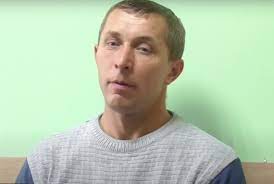 Some of the prisoners we helped have already been released. One of them is the father of many children, Viktor Tsarikevich, from Mosty. In the autumn of 2020, he painted the roads near Savinka, Zapolye and Dubno villages, Mosty district, in red and white colours. Then he placed stuffed policemen under the awnings of the stops “Mikelevshchyna”, “Dubno” and “Charlena”, and in the forest between the city of Mosty and the agro-town of Mosty Pravye, he depicted national flags on thirty-three trees. We supported Viktor during the investigation and his sentence. We included his story in the repressions against families with many children monitoring, transferred to international organizations. And on August 22, 2021, when Viktor was released, we congratulated him on his release.
Some of the prisoners we helped have already been released. One of them is the father of many children, Viktor Tsarikevich, from Mosty. In the autumn of 2020, he painted the roads near Savinka, Zapolye and Dubno villages, Mosty district, in red and white colours. Then he placed stuffed policemen under the awnings of the stops “Mikelevshchyna”, “Dubno” and “Charlena”, and in the forest between the city of Mosty and the agro-town of Mosty Pravye, he depicted national flags on thirty-three trees. We supported Viktor during the investigation and his sentence. We included his story in the repressions against families with many children monitoring, transferred to international organizations. And on August 22, 2021, when Viktor was released, we congratulated him on his release.
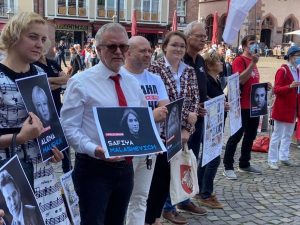 Since August last year, “Our House” has been constantly participating in solidarity actions with political prisoners. On March 8, 2021, Olga Karach participated in the “March of Flowers” dedicated to the repressed Belarusians. In April 2021, we organized an action in support of Belsat journalists Ekaterina Andreeva and Daria Chultsova, actions for the birthday of Maria Kolesnikova and the Day of Remembrance of the Victims of the Chernobyl Tragedy. On May 29, 2021, Olga Karach attended a solidarity rally with Sergei Tikhanovsky in Vilnius and performed on Lukishki Square. And on September 18, a rally of solidarity with Belarusians was in Frankfurt am Main. Representatives of German parties and the Belarusian diaspora participated there. Olga Karach visited the rally with MEP Michael Gahler and representative of the People’s Embassies Mikhail Rubin.
Since August last year, “Our House” has been constantly participating in solidarity actions with political prisoners. On March 8, 2021, Olga Karach participated in the “March of Flowers” dedicated to the repressed Belarusians. In April 2021, we organized an action in support of Belsat journalists Ekaterina Andreeva and Daria Chultsova, actions for the birthday of Maria Kolesnikova and the Day of Remembrance of the Victims of the Chernobyl Tragedy. On May 29, 2021, Olga Karach attended a solidarity rally with Sergei Tikhanovsky in Vilnius and performed on Lukishki Square. And on September 18, a rally of solidarity with Belarusians was in Frankfurt am Main. Representatives of German parties and the Belarusian diaspora participated there. Olga Karach visited the rally with MEP Michael Gahler and representative of the People’s Embassies Mikhail Rubin.
We continue to help political prisoners – after all, it is simply impossible to stop now. The political prisoners of Belarus need us, those who are at large. They need our letters, parcels, publications in social networks and the media – everything that will allow the world to learn about what is happening in our country. But most of all, they need freedom, for which we have been fighting for the second year. We hope that the number of political prisoners in Belarus will not increase, and soon they will all be free.




